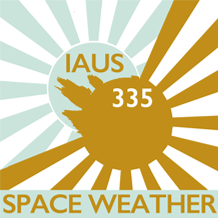Articles

The conference logo represents two seasons in the activity cycle of the Sun, to represent changes in space weather
Prestigious Space Weather symposium announced at University of Exeter
Some of the world’s leading experts will gather at the University of Exeter to take part in a prestigious event, designed to examine the future of pioneering space weather research.
The University will host a high-profile international symposium, entitled Space Weather of the Heliosphere: Processes and Forecasts, at the Streatham Campus in Exeter from July 17-21 2017.
The symposium was agreed at the 98th International Astronomical Union (IAU) Executive Committee meeting, held earlier this year in Mexico – one of nine approved by the IAU to be held next year.
Exeter’s Mathematics department has a strong tradition in weather research, recent growth in space weather areas, together with strong connections to the nearby UK Met Office, based in the city.
It will be the first of its kind held in Exeter, following a successful bid by Dr Claire Foullon, a STFC Advanced Fellow from the Mathematics department at the University of Exeter, who chairs the Scientific and Local Organising Committees.
Dr Foullon said: “Exeter is home to world-leading expertise in weather research and forecasting, and is rapidly expanding its efforts in space weather, and so offers the ideal combination of communities to host this symposium.
“The event intends to communicate how new research on Space Weather is of paramount importance for our high-technology dependent society. Our scientific community has the responsibility to use its knowledge to support tackling societal problems, and progress in forecasting needs to reflect advances in fundamental science.
“One of the roles that the community can play is to identify the research questions that have to be answered in order to improve forecasts.”
The symposium is designed to provide a platform for advances in the field of space weather, as well as discuss key questions and emerging concepts, through a series of invited and contributed talks, and poster papers. Excursions are planned to the Norman Lockyer Observatory in Sidmouth and to the Met Office, which carries out space weather monitoring for the UK. There will also be a number of outreach events to open the symposium to the local community.
Dr Alice Mills, outreach officer and member of the local organizing committee at the University of Exeter added: "We are delighted and honoured to have an IAU symposium in Exeter. Not only is it important for the public to better understand space weather but it is also an area of astronomy and space physics that inspires the public with beautiful phenomena such as auroras.
“We plan an active education/public outreach program to promote astronomy and space weather science among young people (students), teachers and the general public in the UK."
More information about the symposium can be found by visiting its dedicated webpages
Date: 30 September 2016
